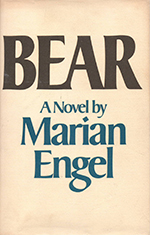 For those who aren’t familiar, there’s no delicate way to say it: Bear is that infamous Canadian novel[ref]Award-winning, bestselling.[/ref] about the woman who has sex with a bear. An actual bear. There is a rather famous, very lurid cover that makes the rounds on social media every so often, but unfortunately I was not lucky enough to find one of those. My copy (pictured here) is a first edition, and rather appropriately comes in a plain brown wrapper. Having not read any of Marian Engel’s other work I was completely in the dark. On the one hand, the premise almost cries out for something gonzo; on the other hand, it is not the done thing to give the Governor General’s Award to works of gonzo literature. Sadly, Bear was not gonzo, but happily, it turned out to be quite elegant. Of all the things it could have been, that was the one I was least expecting.
For those who aren’t familiar, there’s no delicate way to say it: Bear is that infamous Canadian novel[ref]Award-winning, bestselling.[/ref] about the woman who has sex with a bear. An actual bear. There is a rather famous, very lurid cover that makes the rounds on social media every so often, but unfortunately I was not lucky enough to find one of those. My copy (pictured here) is a first edition, and rather appropriately comes in a plain brown wrapper. Having not read any of Marian Engel’s other work I was completely in the dark. On the one hand, the premise almost cries out for something gonzo; on the other hand, it is not the done thing to give the Governor General’s Award to works of gonzo literature. Sadly, Bear was not gonzo, but happily, it turned out to be quite elegant. Of all the things it could have been, that was the one I was least expecting.
The plot is fairly basic: a librarian named Lou travels from Toronto to an island in Algoma District without any modern conveniences to catalogue an estate left to the institute she works for, its library especially. The family that owned the estate traditionally kept a semi-tame bear on the property, for reasons that are not clear to the other locals. Lou finds her life unsatisfying, and she has no one with whom she truly connects; her few relationships are shallow. While working to catalogue the estate, she develops a bond with the bear that has been kept shackled in the old log cabin behind the house. Eventually, in her loneliness, she has sex with it. So there’s that.
The novel’s origins are a bit unusual[ref]Wikipedia tells me it was written as part of a fundraiser for the Writer’s Union of Canada, for which “serious” writers produced pornographic works.[/ref], but even still, Bear is the first classic Canadian book I’ve read this year that is almost entirely inward-facing. In that sense it feels very modern. Everything else I’ve read for my Canada 150 reading project except Mad Shadows aimed for some level of sophisticated psychological representation, but they also had other concerns—mostly class, although in some cases religion and linguistic cultural divides. Bear isn’t interested in any of those things, or at least is only interested in them insofar as they might shed light on Lou’s character, which is extremely well developed.
I don’t know that there’s a lot else to say. Engel’s writing feels very straightforward, one thing happens and then another things happens, clearly and simply. I’m tempted to call it “workmanlike,” but that has negative connotations that I don’t intend. Rather, nothing here feels extraneous or poorly-formed. The rough edges have all been filed down and the surfaces polished, the joints are all square. An elegant, well-made book about bear fucking. Who knew?
One Comment